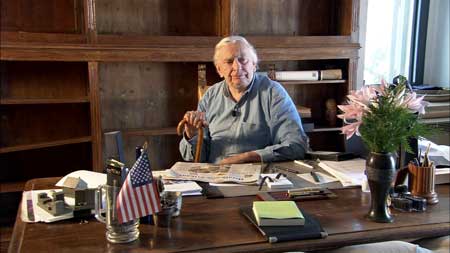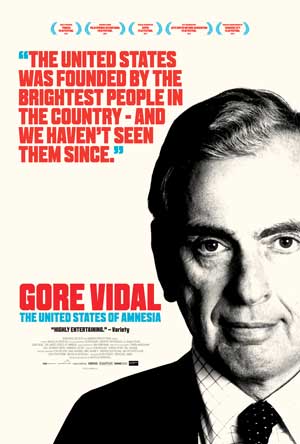Film (2014)
Directed by Nicholas Wrathall
Kendall Square Cinema, Cambridge, MA
Music by Ian Honeyman; Film Editing by Suresh Ayyar, Robert Bralver

in “Gore Vidal: United States of Amnesia”
© 2013 Amnesia LLC. A Sundance Selects Release.
Gore Vidal was so energetically witty, honest and direct in his expression that this film is entertaining right off the bat. It adeptly captures many gems of his oral genius from different stages of his life, including, remarkably, those from his upper 80s, when Vidal retained the same insight and pungent articulation.
Beginning poignantly with a scene of an aged Vidal standing in the cemetery in which he would be buried (he died in 2012) next to his life partner, Howard Austen, the film takes the stance of a look back, then offering a quite comprehensive and entertaining chronology.
Many curiosities about Vidal’s involvements in various circles the literati and of the politically influential are included. The account of his friendship with Jack Kennedy is notable among the political connections, and his severe judgment of Kennedy’s record as president is equally striking. Vidal knew many of the literary greats of the time, including Tennessee Williams, William Faulkner and F. Scott Fitzgerald among many others; the sheer number and range of Vidal’s associations is remarkable and the film touches suggestively upon many of them.
Touching upon the famous showdown between Vidal and William Buckley at a debate on television in 1968, we see Vidal at his most acerbically vituperative. It is captivating to watch these two sharply paired American patricians go at with sharpened tongues; there is something remarkably and delightfully Shakespearean about it.
The clips which show Vidal decades ago speaking about homosexuality are particularly striking because of the amazing prescience they convey; in a distinct minority for the time, he resolutely and courageously expressed a sense of the parity of sexual alternatives.
Vidal, the novelist – of Burr, Lincoln and numerous other works, both historical and not – comes across in several scenes which convey his respect for the required talents and labors of writing.
One character who did not enter into the story here is Anais Nin, with whom Vidal had an early, important and somewhat controversial association. Nin gives a detailed account of the young Vidal in a volume of her famous diary, and it was somewhat surprising she did not get mentioned.
So much about Vidal’s complex and varied life does get incorporated into this cogent and stimulating account that one cannot really complain. Telling its story effectively but not obtrusively, this documentary gives an enriched sense of Vidal’s life and character, allowing him to speak eloquently without getting in the way, a clear indication of its art and its economy.
– BADMan

Leave a Reply